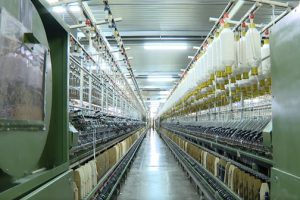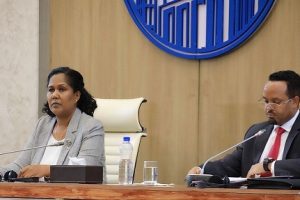
BY BACHA ZEWDIE
It has been repeatedly stated that occurrences related to the war in the northern part of Ethiopia became obstacle for the investment sector. According to the information released from the Ethiopian Investment Commission regarding the main activities and results achieved in the past fiscal year, the investment sector faced war-related challenges such as the Ethiopia’s expulsion from AGOA and pressure imposed by international media. Although there were these challenges in the fiscal year, the commission also announced that better performance was registered.
According to the information, the Commission has done various promotional activities to attract Foreign Direct Investment (FDI) during the fiscal year. It won Gold Award 2021 of “Strengthening IPA Advocacy Services” prepared jointly by The World Association of Investment Promotion Agencies (WAIPA) and the World Bank Group for promoting the country’s investment options and opportunities in various countries.
It was possible to achieve 64.4 percent of the plan by attracting more than 3.3 billion Dollars FDI in the fiscal year, and the commission’s data shows that the instability in the country; the international media and the spread of COVID-19 had adverse impact on the implementation.
In the 2021/22 fiscal year, 168 investors those interested to investing in Ethiopia and met the requirements were given new investment licenses. Among them, 100 planned to engage in manufacturing (77 foreign and 23 local), 62 in services (59 foreign and 3 local) and six in agriculture (foreign).
According to the Ethiopian Investment Commission, in the 2021/22 fiscal year, 77, 122 jobs were created for investment activities outside industrial parks and within industrial parks. 374 projects (304 outside the park and 70 inside the park) were planned to be transferred to implementation (production and service) and 284 projects (234 outside the park and 50 inside the park) were transferred to implementation (production and service).
Composition of the investors who have received new investment licenses in the fiscal year indicates that only 26 of them are domestic investors. This is an indication of the need to focus on increasing the participation of local investors in the investment sector.
Currently, the world’s most powerful countries in terms of their economy and political influence have carried out many activities to support their domestic investors. The work these countries have done in helping and protecting their investors has increased their production capacity and enabled their economic growth to be sustainable. It is known that the basis of their current economic power is their internal production capacity that freed them from external dependence.
Efforts to support local investors can be expressed in many ways. It is possible to support them by formulating favorable and encouraging investment policies; by providing resources including finance; by ensuring infrastructure provision, and by easing bureaucratic procedures.
Economic science and public policy expert, Dr. Kostentinos Berhetesfa said that the government should provide other supports, including finance, to increase the participation of local investors in investment. According to him, it is necessary to build an organized governmental structure to increase the capacity of local investors.
“The potential of local investors can grow when they work with foreign investors who bring capital. Local banks, especially private banks, should move away from overlapping for the benefit of their shareholders and increasing salaries for their employees every year. They should modernize their procedures and increase the loans they provide for development projects,” he said.
All the investors who received license in the agriculture sector during the fiscal year are foreigners. While agriculture is the mainstay of Ethiopia’s economy, the fact that all the investors who have received investment license in the sector are foreigners shows that a lot of effort is needed in connecting the sector with local investors.
Dr. Kostantinos said, “Our biggest asset that can attract local investors widely is agriculture.” He further explained that after the investors take over the land and start working, questions related to boundary issue and land ownership create many obstacles in the investment activities.
“Investors who want to engage in agricultural investment face a lot of harassment and ups and downs in every office. Therefore, in order to increase the participation of domestic investors in the agricultural sector, these problems should be solved,” he stressed. In addition, agricultural knowledge is needed to engage in the agricultural sector. Agricultural investment requires the owner’s knowledge and supervision, he said adding that agricultural knowledge is critical to the effectiveness of investment in the sector.
Dr. Mola Alemayheu, a professor of economics at Haramaya University and a senior researcher at “Frontieri” research and consulting firm, said that supporting local investors is an issue that should not be questioned and will bring real economic change. Apart from their role in providing products and services, the investors have a great contribution in creating job opportunities for citizens; substituting import products and increasing exports, so they should be supported by the government to increase their role.
According to Dr. Mola, it is very important to support local investors, especially during this hard time Ethiopia is being challenged by unemployment and inflation. Government’s support will stimulate the economy, create job opportunities, replace import goods, and increase export trade.
He pointed out that among the problems faced by local investors are the lack of resources (infrastructure), the problem of financing and the lack of foreign currency. He stated that the government should take policy and structural measures to alleviate the problems of the investors, including short-term solutions, and should regularly evaluate and improve the support it provides to the investors.
Supporting domestic investors allows a country to rely on its own producers. It also helps to avoid the risk caused by the changing world politics. In this regard, Dr. Mola pointed out, “Making domestic investors competitive with foreign companies in terms of financial and technological capabilities will help prevent economic breakdown and gaps.”
Dr. Mola further stated that few foreign companies stay in the country as long as the local politics is comfortable. According to him, if the politics is not comfortable and the companies leave the country, there will be a risk that the country will draw back several years. Therefore, in order to avoid this threat, it is necessary to support local investors and strengthen their capabilities.
“Nations that are rich in their economies, not only in the past, but still provide great support and protection to their domestic investors. The countries have different support programs for their investors in terms of finance and other sectors. The support developed countries provide to their domestic investors surpasses that of they provide to developing countries,” he explained.
The Commission stated that Ethiopia’s expulsion from African Growth and Opportunity Act (AGOA) Program; lack of foreign currency; the war in the northern part of the country; the pressure of the international media and the lack of infrastructure provision at the required level are bottlenecks the investment faced during the fiscal year.
“AGOA” is a free trade opportunity that America gave to sub-Saharan African countries. Ethiopia has been a beneficiary of this opportunity. However, due to the political pressure of the US government last year, Ethiopia was blocked from benefiting this free trade opportunity. One of the challenges of the investment sector in 2021/22 is the issue of Ethiopia’s withdrawal from “AGOA”.
Dr. Kostentinos said, “Ethiopia’s expulsion from AGOA is a great misdemeanor against our country. The program was an opportunity for many Ethiopians to get job opportunities as well as professional experience and knowledge those work in the companies that are engaged in the industrial parks. Countries like China and Vietnam have achieved high economic growth because of the work of industrial parks. AGOA was an important program for Ethiopia’s economy.
Dr. Kostantinos reminded that although there are many products that are exported to the US duty-free with the opportunity of AGOA, Ethiopia is more focused on textile products and other African countries are making better use of it. He also said that in addition to the efforts to regain the opportunity to benefit from AGOA, it is necessary to look at other options.
“We should look for alternative solutions and opportunities and not stick to America. We should think about using the African Continental Free Trade Area (AfCFTA). Measures to improve the economy, such as opening the capital market and the banking sector to foreign investors, need to be strengthened,” he said.
The investment sector faced many challenges in the last fiscal year. Even though the country is in these challenges, it is necessary to use the challenges as a way out and compile good experiences that have yielded results. Being able to go this far in the investment sector, which is inherently sensitive to conflict, war, etc. in a difficult situation, indicates that it is possible to travel a long distance when the conditions are favorable. It is necessary to increase national production capacity and make economic growth sustainable and reliable by solving the problems of the investment sector; by using the currently held Ethiopian industrial activity and other ways out of international and similar pressures.
THE ETHIOPIAN HERALD SUNDAY EDITION 23 OCTOBER 2022




